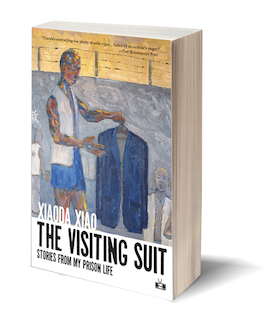The Visiting SuitBy Xiaoda XiaoTwo Dollar Radio |
 |
|---|
Reviewed by Gro Flatebo
The Visiting Suit is a collection of stories covering Xiaoda Xiao’s five-year incarceration for ripping a poster of Chairman Mao off his wall while drunk. An educated and musically gifted twenty-year-old, he is sent to a prison labor camp to mine an unstable quarry where falling rocks kill several prisoners each month.
What sets The Visiting Suit apart from other books documenting the traumas and hardships of China’s Cultural Revolution is the book’s softer, more humane treatment of its material. We experience day-to-day life with its strange twists and small joys: time off to lie in the sun as the rainy season ends, the warmth of a female prisoner leaning against Xiaoda during a movie, and the sweetness of folk music and feasting during the spring festival. Kindness comes in unexpected places, as when one of the girls who steer the flatboats picking up quarry stones offers to deliver messages to his mother.
Even in a men’s labor camp, Xioada finds romance and caring to sustain his spirit. When the men in his construction crew are assigned to harvest tomatoes in the women’s farm fields after work, rumors abound:
Li Tushen was boasting to others how he had kissed two women inmates in one afternoon. According to him, kissing a woman inmate in the field was as simple as finger snapping because a woman inmate would give signals to a man she liked. All he needed do was to follow her until she turned around to meet his lips.
While there, Xiaoda meets a woman with whom he was first arrested and stealthily holds her hand as they walk along the river. At first she resists, but she returns each night: "During the following nights we enjoyed watching our shadows on the river dam and losing ourselves in far-away thoughts." And when the wives of two of his fellow inmates surreptitiously visit their building site, the rest of the men take a twenty minute break and listen to the feverish moans of the couples from an adjacent room. Moments like these illustrate how people survive harsh conditions with their humanity intact.
Make no mistake, these stories take place in a cruel prison. Inmates steal rice powder and food from each other. Hierarchies, power struggles, and group dynamics within the walls of the camp change in an instant:
If somebody forced you to taste a bitter gourd one night, you just remembered to make him cry the next time. The officers encouraged hatred from the inmates and liked to watch prisoners criticize each other violently. Mao’s saying, "The excitement is endless when you fight against people," would reverberate in my ears, whether I criticized the others or was being criticized by the others. This was prison life, brutal and unpredictable. Better keep your tail tight in between your legs.
The dignity of political prisoners making their way through the horror of prison life is tangible, no more so than in the title story. "The Visiting Suit" follows a proud but taciturn inmate imprisoned for listening to foreign radio broadcasts. He brings an out-of-date wool suit, his wedding suit, to wear whenever his wife visits. When he dons the suit, he is transformed.
This was not the Ji who moved stones with me in the quarry, who scraped porridge out of his bowl with his index finger, or remained indifferently silent when I’d spoken with him. He was not a prisoner now. He looked like a man who was going to receive an honor from the government.
Ji engenders respect from the guards and his fellow inmates for the pride he takes caring for the suit and for his comportment when his beautiful wife visits. But time and hunger take their toll. He sells the suit for nine pounds of rice powder, only to renege on the exchange that very night. Ji quietly finishes his term, his self-respect still intact. As Xiaoda says good-bye:
I turned my eyes to Ji’s visiting suit and then to his wife, both worn out since I had first seen and admired them three years ago…Had she had some experience similar to Ji’s with his suit?...As I stood watching them leave, I felt tears rolling down my cheeks….Controller Dong and a few other officers had also stepped out of the reform office to watch until the couple had disappeared from sight.
The stories comprising The Visiting Suit are not all softness and friendship; brutality and punishment form an ever-present backdrop. But Xiaoda does not linger on the injustice or bitterness of his plight. Instead he gives us stories of people surviving and interacting under difficult situations, with camaraderie that fills the void between cruelty and violence . It is the world of the camp’s newspaper wall, rice powder thefts, and bedding dragged out to the sunny yard that stay with you after reading this book.
